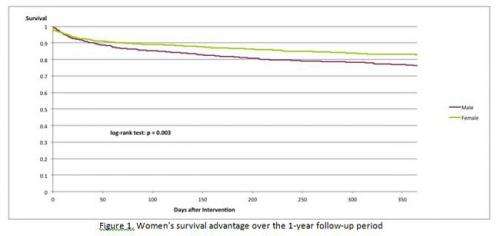Women less likely to die after TAVI than men

Women are 25 percent less likely to die one year after TAVI than men, according to research presented at the ESC Congress today by Dr. Mohammad Sherif from Germany. The findings suggest that TAVI might be the preferred treatment option for elderly women with symptomatic severe aortic stenosis.
Dr Sherif said: "Earlier studies on the impact of gender on outcome after transcatheter aortic valve implantation (TAVI) have had conflicting results. A Canadian study reported in 641 consecutive patients that female sex is associated with a better long-term and short-term survival after TAVI.1 An Italian study of 305 high risk patients found no gender differences in composite safety and efficacy endpoints at 30 days and one year after TAVI."2
The current analysis examined gender differences in outcomes for 1432 consecutive patients from 27 centers who were enrolled in the German TAVI registry between January 2009 and June 2010. Women comprised 57.8% of the cohort. At baseline the average age of women was 83 years vs 80 years for men. Women had aortic valve gradients at baseline of 52 mmHg vs 45 mmHg for men (severe aortic stenosis is defined as gradients exceeding 40 mmHg).
At baseline men had more prior myocardial infarction (22% vs 11.5%, p<0.001); more extensive coronary artery disease (36% vs 16%, p<0.001); more history of open-heart surgery (33% vs 14%, p<0.001); more peripheral vascular disease (37% vs 26%, p<0.001); and more COPD (28% vs 21%, p<0.001).
During the TAVI procedure, 25.2% of women had vascular complications (including iliac artery dissection, and bleeding from the puncture site requiring blood transfusion) compared to 17.2% of men (p<0.001).
At 30 days follow-up mortality was 7.6% for women versus 8.6% for men (p=0.55); however by one year the all cause mortality was 17.3% for women vs 23.6% for men (p<0.01). Dr Sherif said: "Our results show that mortality at 30 days was the nearly same for women and men. Women's higher survival rate at one year could be explained by their longer life expectancy and lower rates of comorbidity in comparison to men."
The investigators did a multivariate analysis to adjust for the effect of differences between women and men in demographic, procedural, and clinical variables on one year mortality. Figure 1 shows women's survival advantage at 12 months. Even after adjustment, female gender was an independent predictor for one-year survival after TAVI with a hazard ratio of 0.75. Dr Sherif said: "This means that women are 25% less likely to die after TAVI than men.
Dr Sherif said: "Lower levels of fibrosis in women might explain the more rapid reversal of myocardial hypertrophy after correction of aortic stenosis and might partially explain the better outcome in women compared with men.3 This might account for the time delay in the female advantage, since the reversal process takes longer than 30 days."
He added: "As a limitation for registry data, these data are observational, and therefore can only be considered to be hypothesis generating rather than causative."
Dr Sherif concluded: "Future work should focus on the effect of sex differences in outcomes for intermediate risk patients undergoing TAVI, and provide longer-term follow up for high-risk patients."
More information: 1 Humphries KH, Toggweiler S, Rodes-Cabau J, Nombela-Franco L, Dumont E, Wood DA, Willson AB, Binder RK, Freeman M, Lee MK, Gao M, Izadnegahdar M, Ye J, Cheung A, Webb JG. Sex differences in mortality after transcatheter aortic valve replacement for severe aortic stenosis. J Am Coll Cardiol. 2012;60:882-886.
2 Buchanan GL, Chieffo A, Montorfano M, Maisano F, Latib A, Godino C, Cioni M, Gullace MA, Franco A, Gerli C, Alfieri O, Colombo A. The role of sex on VARC outcomes following transcatheter aortic valve implantation with both Edwards SAPIEN and Medtronic CoreValve ReValving System® devices: the Milan registry. EuroIntervention. 2011;7(5):556-563.
3 Petrov G, Regitz-Zagrosek V, Lehmkuhl E, Krabatsch T, Dunkel A, Dandel M, Dworatzek E, Mahmoodzadeh S, Schubert C, Becher E, Hampl H, Hetzer R. Regression of myocardial hypertrophy after aortic valve replacement: faster in women? Circulation. 2010;122:S23-S28.















